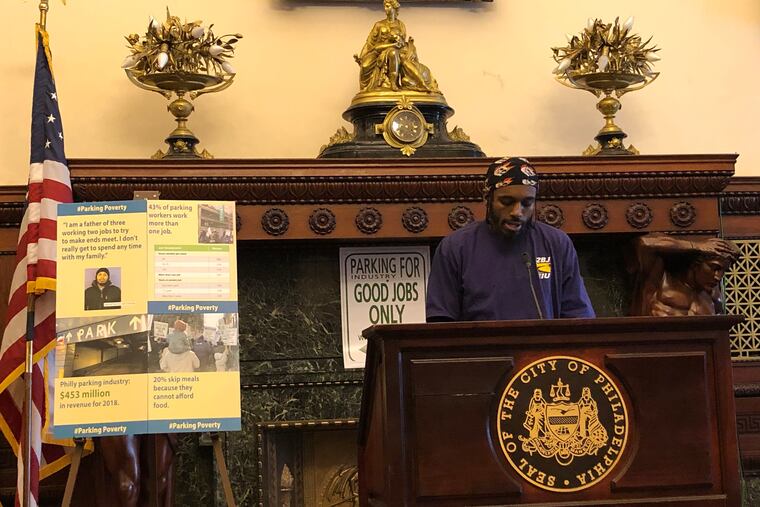Philly City Council members pledge support for workers at hearing on ‘poverty wages’ in parking industry
At a City Council hearing, parking workers -- 90 percent of whom are black -- make their cases for higher pay in the wake of a study that said their median hourly salary for $9.50, a figure disputed by one industry executive.

After 18 years of parking cars in the city, 54-year-old William Harper says, he makes $11.40 an hour. His biggest hourly raise in all those years was 24 cents. He has no health benefits.
“I live paycheck to paycheck,” he told City Council’s Committee on Labor and Civil Service on Monday at a hearing on wages and working conditions in the parking industry. “We are simply asking for a living wage and to be treated with dignity on the job.”
The hearing follows a report by the Keystone Research Center and a local union saying that the median hourly wage for parking workers — 90 percent of whom are black — is $9.50 and that they work in poor conditions.
The industry “is booming on the backs of black and brown low-wage workers,” said Councilwoman Cherelle L. Parker, the committee chair.
Daniel Turner, one of the dozens of parking employees who attended the hearing, says he works two jobs to support his three children.
“I need to work every single available hour,” Turner said. “I work 14-hour days every day, and barely even sleep.” He said that twice his daughter’s 3-year-old birthday party had to be postponed because he had to work.
About 1,000 people work low-wage jobs in Philadelphia’s parking industry, which took in more than $450 million in revenue last year, according to the Keystone report.
Robert Zuritsky, the CEO of major parking garage company Parkway, disputes the $9.50 figure. “I believe” Parkway’s starting wage is $12 an hour, he said in response to the report.
While Council members voiced support for increasing the workers’ pay, it was unclear what action Council might or even could take. Richard Lazer, the deputy mayor for labor, noted that Philadelphia has been unable to enact municipal minimum-wage legislation due to state wage laws.
Parker cited Thomas Jefferson University Hospitals as an example of a private-sector employer that opted to raise wages. Jefferson raised its minimum wage to $15 an hour this year.
Philadelphia NAACP president Minister Rodney Muhammad said that a higher minimum wage would reduce the need for social services among low-wage workers.
“What does it mean for our city if someone like me is doing everything they can possibly do and still isn’t making it?” Turner said. “I park cars in some of the most expensive buildings in the city for people who pay more per hour to park than I make.”